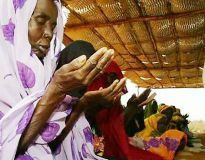Security Council to hold accountable those blocking peace in Darfur
Dec 22, 2005 (UNITED NATIONS) — The U.N. Security Council has demanded that the warring parties in Sudan’s Darfur region honor a ceasefire agreement and reaffirmed its determination to hold accountable anyone impeding the peace process and breaking the arms embargo.
 The council on Wednesday welcomed the start of a new round of peace talks in Abuja, Nigeria, and called on the government and rebels “to fulfill their commitments to conclude a just and full peace accord without further delay.” The African Union-sponsored talks ended Dec. 7 and are not expected to resume until next year.
The council on Wednesday welcomed the start of a new round of peace talks in Abuja, Nigeria, and called on the government and rebels “to fulfill their commitments to conclude a just and full peace accord without further delay.” The African Union-sponsored talks ended Dec. 7 and are not expected to resume until next year.
In a statement read at a formal meeting, the council demanded “that all parties refrain from violence and put an end to atrocities on the ground, especially those committed against civilians, including women and children, humanitarian workers, and international peacekeepers.”
U.N. Secretary-General Kofi Annan warned in a report late last month that Darfur faces an increasing threat of complete lawlessness and anarchy. He had called for a peace agreement between the government and rebels by the end of the year.
In his year-end press conference on Wednesday, Annan listed turmoil in Darfur as one of the major factors that made the year 2005 “a really difficult one,” along with the tsunami in Asia and political turmoil in Lebanon.
When asked what he saw as major global issues in 2006, he said, “we should keep a very close eye” on Darfur.
The Darfur conflict began in February 2003 when rebel groups took up arms against the government, accusing it of neglect and repression of Sudanese of African origin. The government is accused of supporting a counterinsurgency led by Arab militia, known as the Janjaweed, which has been blamed for widespread killing, rape and arson. The Sudanese government denies backing the Janjaweed.
The United Nations estimates that 180,000 people have died in the conflict, mainly through famine and disease. Several million more have either fled into neighboring Chad or inside Sudan.
On March 29, the Security Council passed a resolution imposing an asset freeze and travel ban on people who defy peace efforts in Darfur and smuggle arms into the conflict-wracked area. It created a panel of experts to come up with a list of the main perpetrators who should be subject to the sanctions.
No names have yet been announced and by a separate resolution the Security Council extended the panel’s work until March 29, 2006.
In its statement, the council reaffirmed “its determination to make full use of existing measures under the relevant Security Council resolutions on Sudan, including holding accountable those responsible for violence and violations of the arms embargo, and those who impede the peace process.”
(AP/ST)
